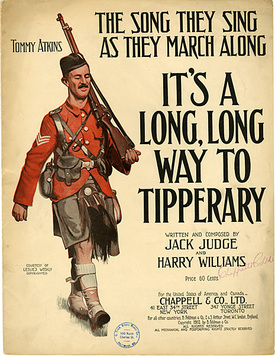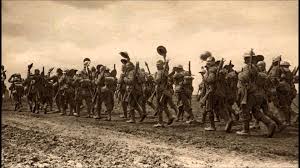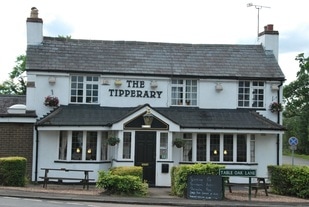It's a long way to Tipperary
|
This is an Irish song written by Harry Williams and Jack Judge. H. Williams was an introvert sensitive person who was confined to a wheelchair after a childhood accident in which he had fallen down the cellar of his father's pub, breaking both his legs. But he was a real talented pianist, poet and composer. He lived in the Tipperary Inn, at that time it was called "The Plough". Williams had met Jack Judge in Oldbury and they started a song-writting partnership, resulting in 32 songs.
"It's a long way to Tipperary" was composed in 1909 and originally it was a sentimental ballad about a lovesick boy in London. At that time the song was called "It's a long way to Connemara". The song's title was changed after Judge had accepted a 5-shilling bet that said that he couldn't make and perform a song in 24 houres. Judge took the song he composed earlier with Williams and he switched Connemara with the name of the village his grandparents came from: Tipperary. The song was published in 1912 by London publisher Bert Feldman. It was Feldman who suggested to change the song from a ballad to a marching song. He also suggested the repetition of the word "long". So the song became "It's a long, long way to Tipperary". |
|
Originaly the song was not meant to be a war song, of course. The chorus makes it clear that the song is about homesickness experienced by Irish ex-patriates in London: "Goodbeye Piccadilly, goodbye Leicester square". But the song became popular among soldiers in the First World War. On August 13, 1914, Daily Mail correspondent George Curnock saw the Irish regiment, the Connaught Rangers, singing this song as they marched through Boulogne. He reported it on 18th of August 1914.
|
The song quickly was picked up by other units of the Britisch army, it was adopted by the Belgian soldiers and the French. Even the Russian soldiers picked it up. In November 1914 it was recorded by the famous tenor J. Mc Cormack, which helped its worldwide popularity.
|
With the royalties he got from the song Williams bought "The Plough" for his parents. He gave the inn a new name "The Tipperary".
After Williams died, Judge came up with the story that he alone wrote the song, but manuscripts did exist proving that the song had existed earlier, under another name, and written by Judge and Williams. After war the song was used in films and musicals, but it will always be remembered as the song of World War I |
|
source: http://en.wikipedia.org/wiki/It's_a_Long_Way_to_Tipperary
http://www.coventrytelegraph.net/lifestyle/nostalgia/famous-marching-song-its-long-6722348 |
Lyrics
Up to mighty London came An Irish lad one day, All the streets were paved with gold, So everyone was gay!Singing songs of Piccadilly, Strand, and Leicester Square, Til Paddy got excited and He shouted to them there:I t's a long way to Tipperary, It's a long way to go. It's a long way to Tipperary To the sweetest girl I know! Goodbye Piccadilly, Farewell Leicester Square! It's a long long way to Tipperary, But my heart's right there. Paddy wrote a letter To his Irish Molly O', Saying, "Should you not receive it, Write and let me know! If I make mistakes in "spelling", Molly dear", said he," Remember it's the pen, that's bad, Don't lay the blame on me ".It's a long way to Tipperary, It's a long way to go. It's a long way to Tipperary To the sweetest girl I know! Goodbye Piccadilly, Farewell Leicester Square, It's a long long way to Tipperary, But my heart's right there. Molly wrote a neat reply To Irish Paddy O',Saying, "Mike Maloney wantsTo marry me, and soLeave the Strand and Piccadilly, Or you'll be to blame, For love has fairly drove me silly, Hoping you're the same! "It's a long way to Tipperary, It's a long way to go. It's a long way to Tipperary To the sweetest girl I know! Goodbye Piccadilly, Farewell Leicester Square, It's a long long way to Tipperary, But my heart's right there. |



